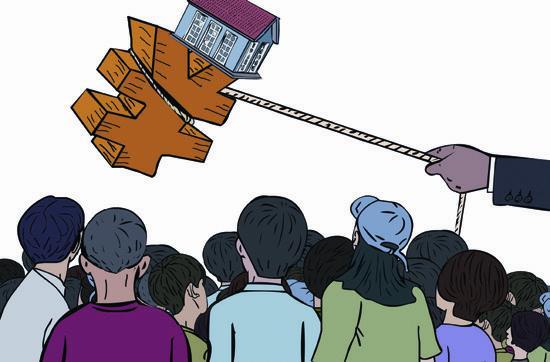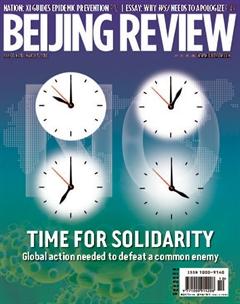Should Housing Provident Fund Be Revoked?

The novel coronavirus outbreak has dealt a heavy blow to a large number of enterprises in China, especially small and medium-sized enterprises (SMEs) and private companies. Against this backdrop, Huang Qifan, former Mayor of Chongqing Municipality and current Chairman of the China International Economic Exchange Center, suggested in a recent article abolition of the housing provident fund system in order to help businesses resume production amid diffi culties caused by the epidemic and alleviate their fi nancial burdens.
Under the system, businesses pay a contribution that is at most 12 percent of a workers salary every month, while the same amount is deducted from the workers salary. The two sums are then deposited into an account under the fund and can be withdrawn only when the worker purchases a house.
Huangs argument is that the system was imported from Singapore in the early 1990s to help urban workers with housing problems and it played an important role for a certain period of time. However, today, Chinas property industry is totally marketized, with commercial banks as the major loan providers. Since the system has outlived its usefulness, its time to get rid of it, which will directly lessen businesses financial burden.
Some believe its time to push forward this reform to end this man-made income gap and social inequality, while others believe the best way to lessen businesses fi nancial burdens is a better-designed tax policy and tax breaks, rather than abolition of this fund, which is supposed to act as a welfare benefi t for workers and may hit the long-term interests of both businesses and individuals.
A bad move
Li Rong (finance.sina.com.cn): Abolishing the housing provident fund will save businesses some money, but in the long run, personnel costs will rise instead of decline. The fund is part of peoples wages and to stop it amounts to a reduction of their income.
The overall wage level, with the housing provident fund included, is a result of various tradeoffs in the market, and if the fund is revoked, the balance is upset, which will trigger another round of tradeoffs throughout the labor market. Thus, the wage level will remain about the same as under the current system.
The fund is tax-free income, so if wages are to be kept at the same level, businesses will have to pay taxes for the part of wages used to replace the fund income. The extra taxes may have to be shared by both businesses and staff. Therefore, in the long term, it will increase the personnel costs of businesses, while workers actual income may fall.
To abolish the fund will do little to alleviate businesses financial burdens, but will instead likely increase tax burdens and counter long-term economic growth.
Du Tao (www.eeo.com.cn): The argument against the fund is that the system is no longer able to keep up with the pace of Chinas current property market development. Unlike in the 1990s, commercial banks are now the major agents to provide home mortgages, so getting rid of the fund will help save businesses at most 12 percent of a workers wage.
For individuals, when the fund is gone, they will no longer have 12 percent of their wages deducted every month. They can use this part of their wage as they please. However, this convenience can be obtained without the removal of the fund, with a simple adjustment of the withdrawal system.
As for businesses, to stop their contribution on behalf of their employees will defi nitely reduce their fi nancial burdens, but at the cost of their working staff, who will see a decline in their income. Such a myopic practice may hurt their long-term interests.
Actually, to help businesses through fi nancial diffi culties during the epidemic outbreak, the adjustment of the current taxation policy is a much better choice. For example, to cut corporate income tax and offer tax breaks during the outbreak will have more immediate and direct positive impact on businesses. There is still a large space for tax policy reform. To abolish the housing provident fund is the worst choice and it should not be taken into consideration.
Shang Fan (www.citreport.com): The contribution to the housing provident fund is indeed a big fi nancial burden on businesses. Superfi cially, getting rid of it will swiftly lower their personnel costs and lift them out of diffi culties during the outbreak.
The fund system is a benefi t to the people from the state. With its help, many urban workers have managed to settle into new houses, and Chinas property industry got a lift, sustaining Chinas economic growth.
Undeniably, income gaps among different industries are widening. High-income earners have more to gain from the housing provident fund system, while low-income workers find it more and more difficult to achieve their dream of purchasing a house through the fund.
There are indeed many fl aws in this system, but this is not a problem of the system itself, rather a result of overdue reform. For any system to successfully cope with an era of rapid development and changes, reform must follow. It should always be adjusted in favor of the poor and the needy, instead of allowing it to lean toward the rich.

Chinas economic development depends on the people and is for the people. To abolish the fund will give businesses immediate relief, but its unacceptable to sacrifi ce ordinary workers welfare for this end and runs against the states principle of economic growth for the benefi t of the people.
Its important to relieve businesses, particularly SMEs, of fi nancial burdens, but there are many other ways. Along with tax cuts and breaks, the businesses themselves should try to improve their operational strategies and tactics to increase profits so as to get out of their current predicament as quickly as possible.
Its a good idea to help the many businesses struggling in this period with some new policies, but its an unwise proposal to do so by decreasing ordinary workers welfare benefi ts.
Its time
Dong Dengxin (finance.sina.com.cn): Although this is not a suggestion from an economics professional, it still exposes the flaws in Chinas housing provident fund system and even the overall social security system. Actually, in the face of whopping social security contributions, listed companies and state-owned enterprises are mostly fi nancially capable of covering all their staff and pay in full. Some SMEs are unable to offer full coverage to their staff, let alone make full payments. Therefore, apart from adding huge financial pressures to businesses, the current social security system, which includes the housing provident fund, is not working effectively or sustainably.
Mo Kaiwei (The Beijing News): The fl aws in design, management and social fairness, as well as legal loopholes existing in the current housing provident fund system are obvious.
The most striking problem is that it adds to the income gap. Well-performing businesses and organizations make large contributions, while their staff can correspondingly withdraw more funds than those working for smaller companies. The housing provident fund is actually a channel for a fraction of workers to obtain more welfare.
While increasing the income gap, it is exacerbating social inequality. According to current rules, the contribution cant exceed 12 percent of a workers salary, but this proportion varies greatly among different businesses. The contribution can be as low as 300 yuan ($43) and the highest is about 3,000 yuan ($430).
The withdrawal of money from the housing provident fund is under strict control, and the interest rate for the savings under the funds account is lower than that offered by commercial banks, which leads to the shrinking of wealth and a big loss for low- and middle-income families. The rule is that the fund can be withdrawn only when one has purchased a house. Families without enough money to buy a house cannot access these savings. Although the interest rate on loans through the fund is relatively low, if families dont buy a house, they cant enjoy this benefi t either.
The housing provident fund system can never really help to solve the problem. Its time to revoke it and replace it with something fairer and more workable.

